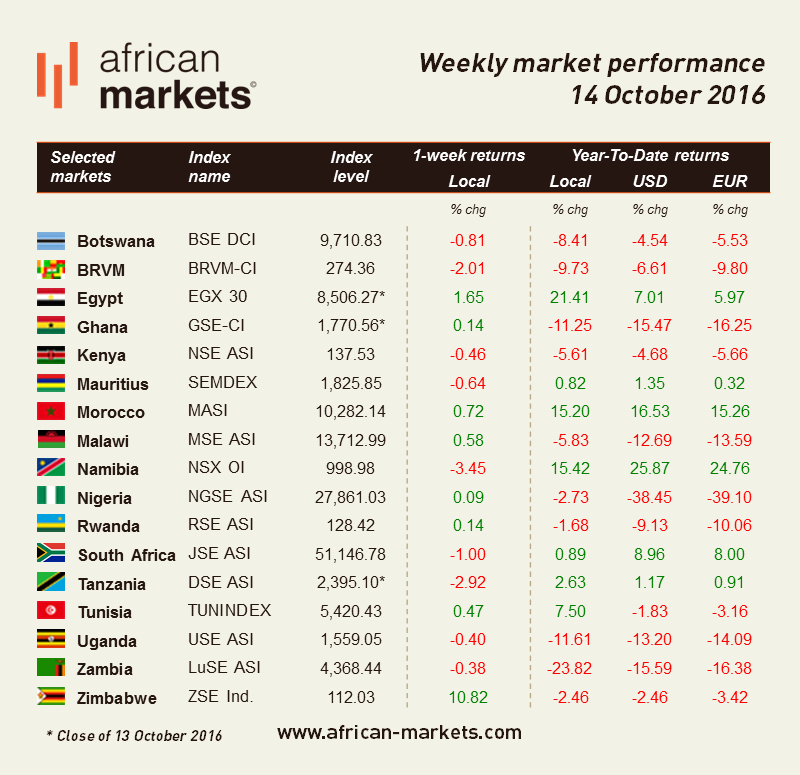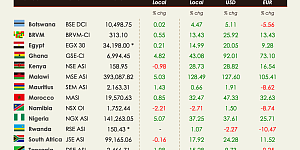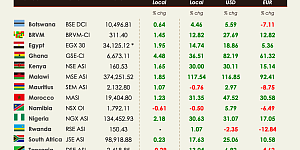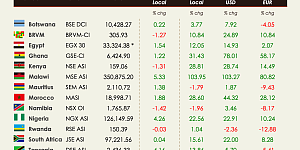The ZSE Ind. is the best performer of the week, gaining 10.82% as most heavy weights showed strong performance thanks to solid demand. Moreover, Dr Mlambo, deputy governor of the Reserve Bank of Zimbabwe announced the country would not join the rand monetary union despite calls from business to do so in order to increase its competitiveness. Mlambo cites South African rand’s own challenges and the fact that the country does not have its own currency. He however recognised that using the US dollar was not optimal because of liquidity issues. The strengthening of the dollar against regional currencies has weakened the competitiveness of Zimbabwean goods on the regional market, which has hurt the local industry.
Nigeria’s Budget and National Planning Minister announced its plan to increase foreign borrowing next year as a way to reduce financing costs thanks to lower interest rates on foreign debt. Preliminary budget documents suggest that Nigeria should raise its budget by 12.6% to reach 6.87 trillion naira in 2017 in an attempt to trigger growth after a difficult 2016. Nigeria’s current leverage totals 13.2% of GDP which is among the lowest level in sub-Saharan Africa. However, financing costs are above 35% of revenue as mentioned in budget documents. Nigeria is looking to raise $4.5bn foreign debt through 2018 including the $1bn Eurobonds of this year. The cash will mostly be invested in capital projects. In parallel, the banking sector is under pressure in Nigeria dealing with devaluation of the naira, growing bad loans and a contracting economy. According to Moody’s non-performing loans will grow by more than 12% over the next 12 months. Moodys’ believes that Guaranty Trust Bank, which showed the greatest resilience, Zenith Bank, Access Bank and United Bank for Africa are all able to absorb losses under its severe stress scenario. The NGSE ASI gained a mere 0.09%.
The JSE ASI lost 1.00% this week. S&P declared this week that South Africa should meet its fiscal targets as set in its budget if it wanted to keep its investment grade credit rating. This statement follows a declaration by former Finance Minister Trevor Manuel who judged a downgrade to junk likely. The credit rating agency is expected to make its decision known on 2nd December while South Africa is in the middle of political tension and just after prosecutors have decided to charge current Finance Minister. Following a long investigation, Gordhan has been charged this week of fraud over his approval of the early retirement and later reappointment of a former colleague. Risks of a downgrade have been pending on South Africa for about a year now and one side of the argument could be that they are already priced in. On these news, South Africa’s big four (Standard Bank Group, Barclays Africa Group, FirstRand Ltd and Nedbank Group) dropped 3.6%.
The EGX30 rallied at the end of the week, gaining 1.65%, as hope came from potential aid from Saudi Arabia to reach the requirements to finalise the $12bn IMF loan deal that would help the country stumbling economy. News was reported on Wednesday that the country’s central bank received a deposit of $2bn from Saudi Arabia. This brings Egypt closer to the requirements given by the IMF to secure $5-6bn in supplementary funding to receive ultimate approval on its loan package arranged in August. Prospects of a looming devaluation sent the Egyptian pound to record low nearing 16EGP to the dollar on the black market.
News came that China has provided a SH97 bn grant to Tanzania in support of education, seaports, health and airline security. China has agreed in principle to support Tanzania’s industrialisation plan as stated in the Second Five Year Development Plan that will go through until 2021. The DSE ASI lost 2.62% this week.










































